Chicago-Kent Magazine
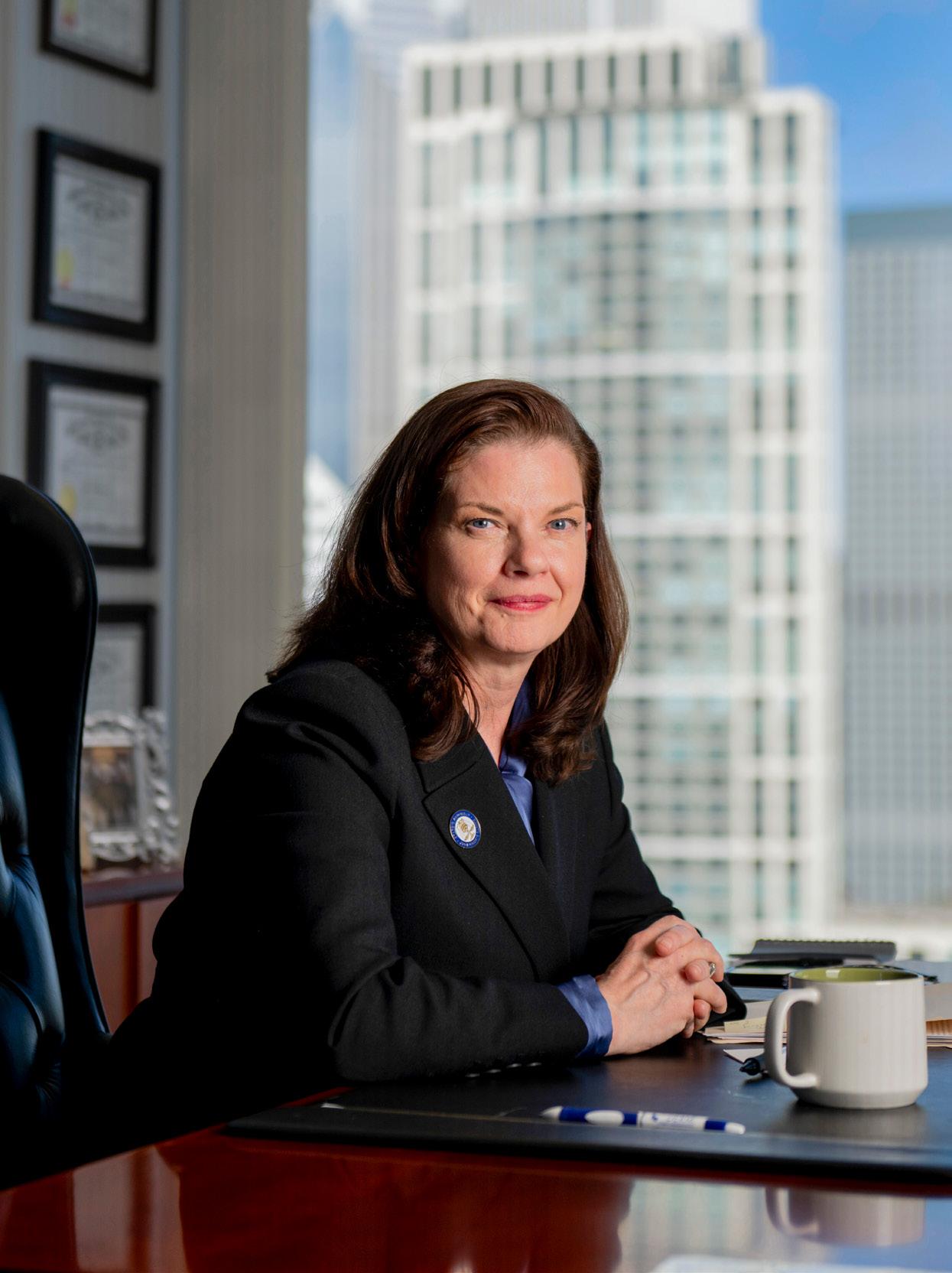
All Sides of the Law
Chicago-Kent alumni lead the pack in the fight for justice, redemption, and the rule of law
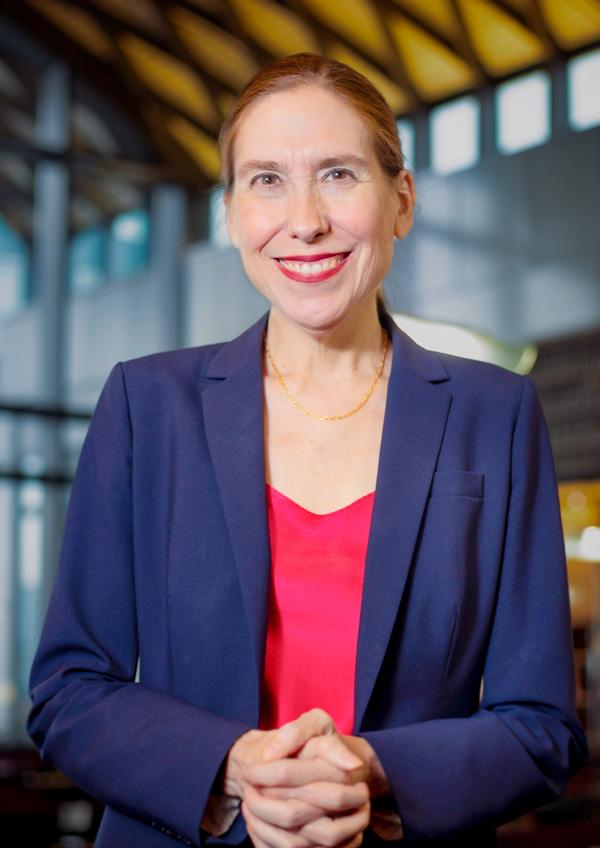


Chicago-Kent alumni lead the pack in the fight for justice, redemption, and the rule of law

Dear Alumni,
AS YOU MAY KNOW, MY TENURE AS DEAN OF Chicago-Kent College of Law is coming to a close, but it will end on a positive note.
Chicago-Kent’s intellectual property program has been ranked as one the best programs of its kind in the Midwest and #9 in the nation, according to the U.S. News & World Report’s 2025 rankings. The college was also honored earlier this year by the president of Kosovo for its “contribution and dedication to academic growth in Kosovo.” One of our students was also awarded one of the prestigious Skadden fellowships, while a recent alum earned the Burton Award (a first for Chicago-Kent).
This issue of Chicago-Kent Magazine highlights those achievements, and also tells the stories of four alumni who are working in the field of criminal law. With a J.D. Certificate in Criminal Litigation, a criminal defense litigation clinic, and a nationally ranked trial advocacy program, Chicago-Kent offers its students ample opportunities to immerse themselves in the world of criminal law.
As a result, Chicago-Kent alumni are prominent in every corner of Illinois’s criminal courts. Eileen O’Neill Burke ’90 gave up her dream job as a justice of the First District Appellate Court of Cook County to run for—and win—the Office of Cook County State’s Attorney. You’ll find Ali Ammoura ’12 on the other side of the courtroom, working as
an assistant Cook County public defender, compassionately guiding his clients through the criminal courts. If Ammoura’s efforts are unsuccessful, his clients may eventually find themselves in front of Ginger Leigh Odom ’03, director of expungement at Illinois’s Office of the State Appellate Defender. Her work helps thousands of Illinois residents find redemption and build new lives every year. Lastly, Heather Widell ’12 was still in her twenties when she bought her boss’s defense firm. Ten years later, she and the firm are thriving and fighting on behalf of criminal defendants in Chicago.
With her recent election, Burke is the second Cook County State’s Attorney to have graduated from Chicago-Kent—Anita Alvarez ’86 served in the role from 2008–2016. When I see the strength of our criminal law program, speak to our bright students, and read about the work that our alumni are doing, I know that Burke won’t be the last state’s attorney to walk the halls of the Conviser Law Center. As you read this issue of Chicago-Kent Magazine, I’m sure you will come to the same conclusion.
It is with that confidence that I thank you for allowing me to serve as your dean for the last six years. The opportunity has been one of my greatest professional honors. Thank you.
Anita K. Krug Dean and Professor




Eileen
Dean
Associate
Content
Editor
Senior
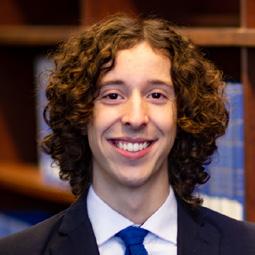
Joseph Strom ’25 was chosen as a recipient of the prestigious Skadden Fellowship, a two-year fellowship that is offered to recent law school graduates who are pursuing public interest law projects.
Strom designed a program to address discrimination against people with disabilities in the form of new technological barriers to securing and keeping meaningful employment, including denial of remote work, website accessibility, and the use of artificial intelligence or other advanced software. He will work with Equip for Equality, a federally mandated legal aid organization that is dedicated to empowering individuals with disabilities in Illinois.
A team from Chicago-Kent College of Law emerged as winners of the National Medical-Legal Trial Competition hosted by the Maurice A. Deane School of Law at Hofstra University and Donald and Barbara Zucker School of Medicine at Hofstra/North-
well in Hempstead, New York, in November 2024.
John Travlos ’26 and Ella Youash ’26 acted as the plaintiff team, while Ivy Ramirez ’27 and Samantha Lehman ’26 comprised the defense team. It was the first competition for all four students. They lost only two ballots in the entire competition.
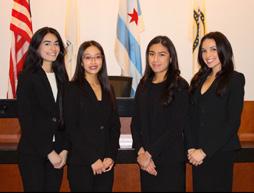
Two teams of Chicago-Kent College of Law students captured titles at the 2025 National Trial Competition regionals that were hosted at Chicago-Kent on February 7–9, 2025.
Ella Youash ’26 and Samantha Lehman ’26 comprised one team, while Ivy Ramirez ’27 and Serena Napolitano ’26 made up an equally successful second team. The teams won both final rounds, beating students from Washington University Law School, Northwestern University’s Pritzker School of Law, Loyola University of Chicago School of Law, and others. Napolitano and Youash also took home Best Advocate awards in their respective categories.


A team from Chicago-Kent College of Law took first place in the Queens County (New York) District Attorney’s Office’s 10th Annual Mock Trial Competition during the weekend of March 9–10, 2025.
John Travlos ’26, Aidan Boyle ’26, Kathryn Connors ’26, and Allyson Weubbe ’26 beat out 17 other nationally ranked law schools to take the top prize for the first time at the competition, which was held in the Queens Criminal Court in New York. Judges from the New York Supreme and Criminal courts presided over the immersive and highly realistic proceedings, while senior prosecutors and members of the defense bar judged the competitors.

Professor Christopher W. Schmidt was recently elected to serve a three-year term on the Board of Trustees for the Law and Society Association, which is described as an “interdisciplinary scholarly organization committed to social scientific, interpretive, and historical analyses of law across multiple social contexts,” according to the group’s website.
Schmidt is a trained legal historian, with a focus on the
relationship between social movements, legal institutions, and constitutional change in the twentieth century. He’s currently writing a book on the history of the United States Supreme Court and its changing place in American political life.
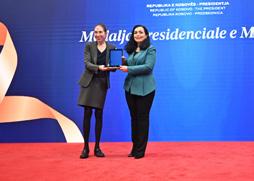
The Republic of Kosovo has awarded its Presidential Medal of Merits to Chicago-Kent College of Law for its “contribution and dedication to academic growth in Kosovo.”
Kosovar President Vjosa Osmani Sadriu presented the medal to Chicago-Kent Dean Anita K. Krug at a ceremony in Prishtina, Kosovo, on February 18, 2025. The presentation was a part of a larger celebration of the country’s 17th anniversary of its independence from Serbia.
Before Kosovo earned its independence, former Chicago-Kent Dean Henry H. Perritt Jr. launched Operation Kosovo, a nation-building initiative to help the new government find its footing, in 1997. As part of the initiative, Chicago-Kent students helped with economic development projects and war crime tribunals, among other things.
Chicago-Kent College of Law alumni feature prominently in the nationwide 2025 Super Lawyers list. More than 1,000 Chicago-Kent alumni currently make the cut, which ranks third among law schools in the state of Illinois.
Super Lawyers, part of Thomson Reuters, is a rating service that recognizes the
top 5 percent of outstanding lawyers who have attained a high degree of peer recognition and professional achievement. The patented selection process combines peer nominations and evaluations with independent research.
Michael Paul Galvin Chair in Entrepreneurship and Applied Legal Technology Nancy Kim recently published her latest book project, titled The Cambridge Handbook of Emerging Issues at the Intersection of Commercial Law and Technology (Cambridge University Press 2025), which was co-edited with University of California, Davis Professor of Law StacyAnn Elvy. The pair decided to collaborate on the book after recognizing the gaps in knowledge about the laws surrounding new technologies. Kim recruited Illinois Tech Associate Professor of Behavioral Design Ruth Schmidt to contribute a chapter, “Behavioral Implications and Emerging Legal Issues in Innovative and Digital Product Design,” which explains how design can affect social interactions and privacy. She also teamed up with Lance Fortnow, dean of Illinois Tech’s College of Computing, to write a chapter about artificial intelligence: “Contract and Commercial Law Challenges with AI Products and Services.”

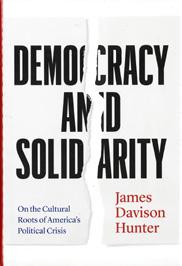
James Davison Hunter’s Democracy and Solidarity: On the Cultural Roots of America’s Political Crisis (Yale University Press 2024), winner of Chicago-Kent College of Law’s 2024 Roy C. Palmer Prize on Democracy, Civil Liberties, and the Rule of Law, is written on the premise that American democracy is undoubtedly in peril. Where Hunter sees room for disagreement is in the source of the conflict, and how to go about fixing it.
Hunter, the LaBrosseLevinson Distinguished Professor of Religion, Culture, and Social Theory at the University of Virginia, introduced the concept of “culture wars” 30 years ago, and he continues to explore how cultural divides are affecting American democracy, while also offering places where citizens can find common ground.

Ryan Martin ’23 won a 2024 Burton Award for his paper, titled “The Sincere Parody: Analysis of the Copyright Implications of an Emerging Trend in Musical Theatre.” He was presented with the Law360 Distinguished Legal Writing Award on May 19, 2025.
The annual Burton Awards
recognize the 15 finest law school writers, who are nominated by top United States law schools. The awards are run in association with the Library of Congress and co-sponsored by the American Bar Association and Sullivan & Cromwell LLP.
Martin currently practices in the Labor, Employment, and Immigration team at Sidley Austin LLP, where he specializes in employment-related advice and counsel.
The Intellectual Property program at Chicago-Kent College of Law has been ranked as one of the top 10 IP programs in the country, according to the U.S. News
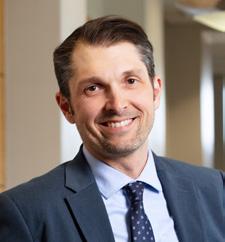
& World Report’s 2025 rankings of best graduate schools. Chicago-Kent’s program is ranked #9. The new ranking places Chicago-Kent as the #1 destination for IP scholars in the city of Chicago, the state of Illinois, and across the Midwest. It also represents a nine-spot jump from 2024’s #18 position.
Chicago-Kent’s IP program was founded more than 25 years ago and has grown into a program with robust offerings for students. The program is currently directed by Chicago-Kent faculty members Graeme B. Dinwoodie, Sarah Fackrell, Greg Reilly, and Cathay Y. N. Smith
Jason J. Czarnezki has been appointed as the next dean of Chicago-Kent College of Law at Illinois Tech, effective June 1, 2025. Czarnezki joins Illinois Tech from Pace University’s Elisabeth Haub School of Law, where he serves as associate dean of environmental law programs and strategic initiatives, the Gilbert and Sarah Kerlin Distinguished Professor of Environmental Law, and faculty director of the Sustainable Business Law Hub.
Throughout his career, Czarnezki has demonstrated a passion for transforming legal education, advancing specialty programs, and expanding community engagement. At Pace, he elevated the Environmental Law program to a #1 national ranking in the country according to U.S.News&WorldReport—a distinction it has held for four straight years and five of the last six— by emphasizing innovation, diversity, and collaboration. He plans to bring this same forward-thinking approach to Chicago-Kent, focusing on key areas such as trial advocacy, intellectual property, and the school’s parttime program.
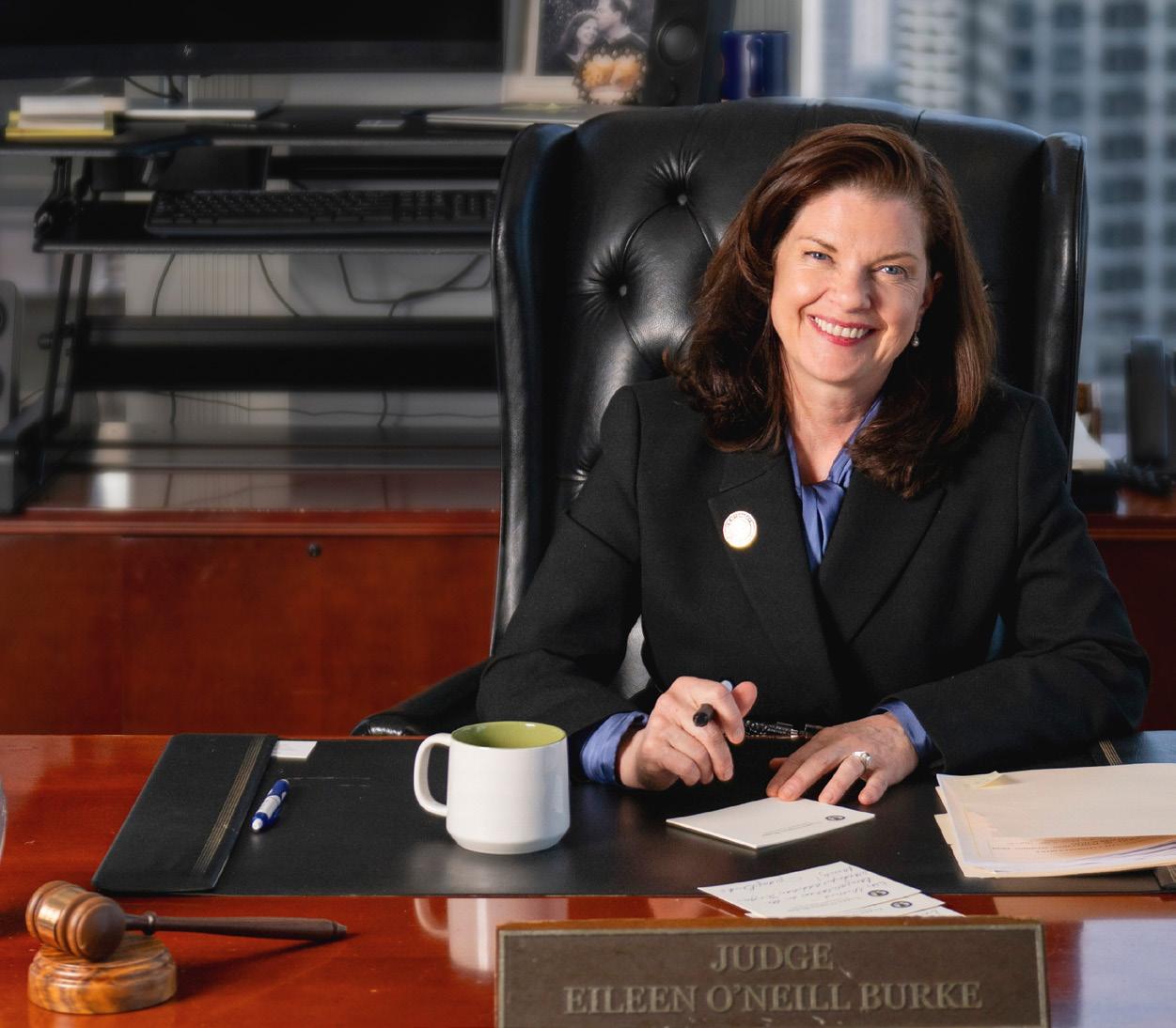
EILEEN O’NEILL BURKE ’90 WAS IN THE SIXTH GRADE when former justice Mary Ann G. McMorrow spoke to Burke’s class about her career as a judge.
McMorrow went on to be the first woman to serve on the Illinois Supreme Court and as its first chief justice, and the adolescent Burke suddenly had a dream to chase: she wanted to be a judge.
“This was the 1970s, and there were not that many female judges,” says Burke. “[A female judge] was not a unicorn, but maybe an exotic bird that you don’t see that often.”
Enrolling at Chicago-Kent College of Law after completing her undergraduate degree seemed like the obvious next step for the fourth-generation Chicagoan, particularly someone who knew where she wanted her path to end.
“Kent really had the best trial program of any law school in the city,” she says. “I knew that was what I wanted to do. I wanted to be a trial attorney. Kent was a natural fit for me.”
As a student at Chicago-Kent, Burke joined Moot Court Honor Society and the trial advocacy team, which were “always my favorite classes: trial ad, evidence. If I’m being honest, it was because those were easier than studying the law. [It was] just getting up and talking. I could do that.”
She also credits Chicago-Kent’s legal writing program for helping to prepare her for her next steps on her path toward her goal of being a judge.
Burke started her legal career writing briefs in the appeals division at the Cook County State’s Attorney’s Office.
“They made me a supervisor within five months of being in appeals,” she says. “That was all because of exactly what I had learned at Kent. We were ahead of the curve because we had done so much writing and all the things that you need to know in order to be effective as a writer.”
She then started covering trials, even investigating cases of alleged sexual abuse leveled against the Archdiocese of Chicago, and eventually moved to felony review, a division of the prosecutor’s office that is available around the clock to review felony cases prior to charges being filed. After five years of late nights at police stations with a young son at home, Burke wanted some stability. That’s when she switched to criminal defense.
“There’s a wide network of former state’s attorneys who were doing defense, and they all needed people to start covering cases for them,” she says. “I started doing defense just by covering cases for people.”
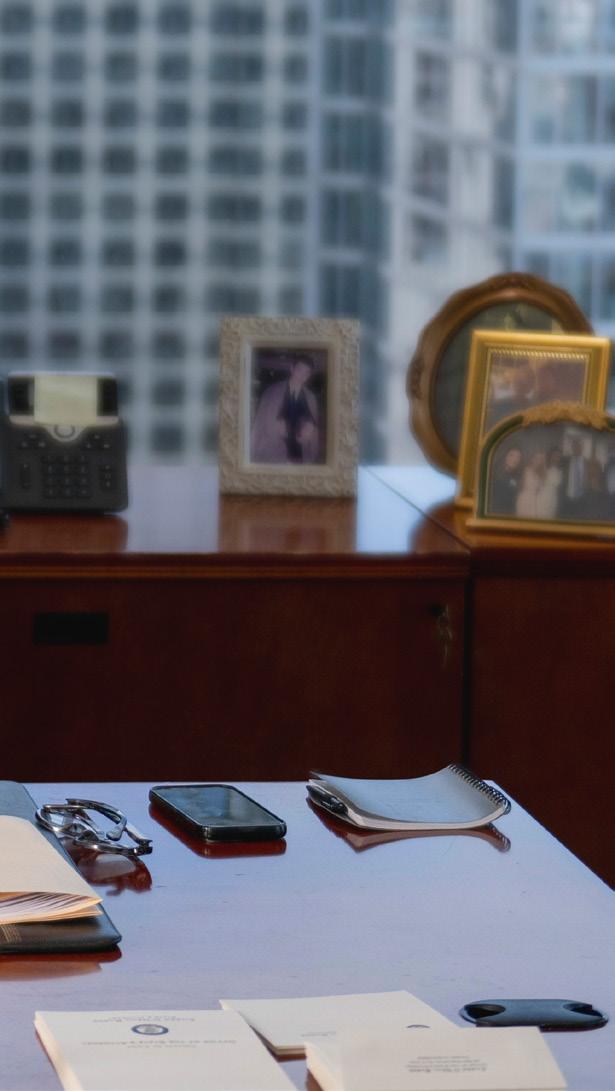
“Nobody has any faith in the justice system. The defendants don’t have faith, the victims don’t have faith, and none of the practitioners have any faith in the justice system right now.”
—Eileen O’Neill Burke
She eventually grew her one-off cases into a thriving defense practice, which provided her with a completely different view of the courtroom than anything else she had seen.
“I learned so much being a defense attorney, and it made me so much better as a judge,” she says. “You see both sides, and you really understand the pressures of both sides, too.”
She continues, “If I hadn’t had that experience, I don’t know that I would have been as balanced as I was on the bench, and that’s a mark of a good judge.”
After eight years as a defense attorney, Burke felt ready to make her middle-school dreams a reality. She ran for a seat on the Circuit Court of Cook County and won.
The job was everything that she hoped it would be. She describes it as “the best job in government.”
She spent eight years presiding over criminal and civil cases before being elected as justice of the First District Appellate Court in Cook County. But despite how much she loved her job, she couldn’t shake a little voice in the back of her head telling her, “This isn’t working.”
“Nobody has any faith in the justice system,” she says. “The defendants don’t have faith, the victims don’t have faith, and none of the practitioners have any faith in the justice system right now.”
Despite working her dream job—and not being ready to step down from the bench—there was a little voice in the back of her mind that started to become stronger, giving her the idea—and confidence—that she could be a great state’s attorney.
“It needed somebody who’s been on both sides, who’s been at every vantage point to right the ship,” she says. “If I wasn’t going to do it, I didn’t know who was going to do it.”
After convincing her husband that she wasn’t crazy for giving up her dream job, she threw her hat into the ring with his backing.
Still, the experience was not what she expected.
“If I had any idea of how difficult that was going to be, I probably would have never done it,” she says. “I’m an introvert, and that election was nothing like a judicial election. In judicial elections, everybody’s pretty nice to you. It’s not the bare knuckles brawl that this election was. I was a little bit unprepared for that.”
But after enduring the election cycle, Burke was elected as Cook County State’s Attorney. She won approximately 67 percent of the vote in the general election on November 5, 2024.
She became the second Chicago-Kent alum to earn the honor: Anita Alvarez ’86 served from 2008–16.
“I want to make the entire system work better, and we’re already making significant changes to the office and how we approach things and how we do things,” she says. “I want everyone who works here to feel like they’ve made a difference and that they’ve made the world a better place because they’ve worked here.”
Clare McWilliams, a retired judge in the 10th Subcircuit of the Cook County Judicial Circuit Court, says that it’s natural for Burke to set high standards for herself.
“I really think she’s a renaissance woman. She does so much. She’s brilliant. She’s fair,” says McWilliams, a longtime friend of Burke. She continues, “When I look at the scales of justice, that symbol resonates with me when I think of Eileen. She is truly blind to any prejudices that anyone has. She follows the evidence and the facts and just stays straight down that road and has no fear.”
A central part of Burke’s strategy for the state’s attorney’s office is to develop a training program for prosecutors, which she hopes to turn into a model that other prosecutors’ offices across the country can build on.
Teaching and training has always been a passion for Burke. She developed a training program on civil procedure for Illinois judges, and since 2012, she has taught it to every incoming justice statewide.
She also served as president of the Illinois Judges Association. Through that organization, she made in-school programming a priority—bringing her story full circle.
“The Illinois Judges Association was a perfect vehicle for utilizing the very, very limited bully pulpit that judges have in an effective way,” she says. “I presented to thousands of high school and grade school students. I’m proof positive that having somebody come and talk to you could give somebody an idea that they may never have had before about what they want to do with their career.”
“MR. AMMOURA, IS THAT YOU?”
It was summer 2011, and Ali Ammoura ’12 was a law student at Chicago-Kent College of Law when he heard a meek voice cut through the hustle and bustle of the lockup at the George N. Leighton Criminal Courthouse located near the corner of 26th Street and California Avenue in Chicago’s Little Village neighborhood.
A former Chicago Public Schools teacher, Ammoura turned around and found himself face to face with one of his former students.
“It broke my heart,” Ammoura says. “The student was in my homeroom class. He sat next to my desk. He’s a good kid, and he’s there for armed robbery.”
When he started at Chicago-Kent, Ammoura hadn’t been sure of what sort of law he wanted to pursue.
But when he saw the look of confusion and terror in his former student’s eyes, he knew he found his calling.
“I know that student personally. He’s not a statistic, he’s not a number,” says Ammoura. “He deserves an opportunity to be heard and to be represented. It was right then and there that I knew I could never stand on the opposite side, prosecuting him. Where I really wanted to be was sitting with people like him and holding space for them and giving them advocacy and representation.”
Fourteen years later, Ammoura is still representing indigent clients who are accused of crimes as a lawyer for the Office of the Cook County (Illinois) Public Defender.
He was first assigned to the Family Defense division where he represented parents whose children had been taken away due to allegations of abuse or neglect. He then spent five years in Chicago’s south suburbs in Markham, Illinois, where he represented those accused of domestic violence, traffic violations, and juvenile delinquency.
In 2019 Ammoura was transferred to the county courthouse at 26th and California— where he remains to this day, representing adults accused of felonies.
“Someone asked me recently, ‘Good guys or bad guys. Who do you represent?’” Ammoura says. He says that he responded, “It’s not that black and white. I represent people who are accused of committing
a crime, of doing something that society considers to be immoral or wrong. These are human beings. They’re not monsters.”
Ammoura’s job is to defend his clients’ best interests, no matter what mistakes they may have made in their lives.
In his eyes, the clients are all just humans in need.
“I get to be with people who are going through some pretty serious struggles, and maybe even the most challenging or one of the most challenging experiences and times in their lives,” he says. “Whether they committed this crime or not, my job is to help them through this situation, to be there with them.”
“I represent people who are accused of committing a crime, of doing something that society considers to be immoral or wrong. These are human beings. They’re not monsters.”—Ali Ammoura
His colleague, office mate, and frequent trial partner, John Kwon, acknowledges that Ammoura’s ability to empathize with clients, and anyone else who walks into the office, sets him apart from his peers.
“Ali is very empathetic,” says Kwon. “He doesn’t judge, which sometimes, in our profession, it’s hard not to, but he doesn’t.”
Kwon says that a major part of the job at the public defender’s office is to mentor and train interns, something that he says that Ammoura is especially good at.
“He’s a very compassionate man,” says Kwon. “His greatest strength is he loves being a teacher and mentor. He really takes the interns under his wing. He loves keeping in touch with them even after their internship.”
Although he left public-school teaching, Ammoura’s dedication to juvenile justice, working to combat the school-to-prison pipeline, and helping to build up the next generation remain his top priorities.
That is why he served as president of the Hyde Park-Kenwood Community Conference—a neighborhood group that prioritizes urban renewal, stabilization, an integrated community, and neighborhood
safety—for three years. He also teaches juvenile justice as an adjunct faculty member at Chicago-Kent.
Despite his dedication through those roles and his mentorship, Ammoura says that he felt that he needed to do more to help support the next generation. Pulling from his experiences as a public defender, he decided to take an unconventional approach.
“In at least 90 to 95 percent of my cases, when my clients who are 17 and under show up to court, it’s with their mothers or with no one and not with any father or any man in their life,” he says. “We learn from those who raise us, and in the absence of anyone who raises us, who then shows us how to live? And for my clients, it was the streets that were showing them how to live.”
Ammoura knew that he couldn’t force fathers to show up for their children, but he wanted to understand why there were so many who wouldn’t.
He looked inward, to his own understanding of masculinity, and decided to get involved in the Mankind Project, a nonprofit that offers peer-facilitated men’s groups and mentoring.
“It’s a men’s organization where the focus is helping men lead healthy, masculine lifestyles and helping men to heal and to give back to the world in positive ways by helping ourselves,” he says. “How many men out there just don’t love themselves? We have needs and yet society tells us to carry the weight of the world on our shoulders.
“For me, it’s a noble cause, helping half the population to show up better in the world for themselves and their children.”
As a public defender, Ammoura is often tasked with cleaning up the pieces of a broken world. He says that his clients are often themselves victims of discrimination and abuse, and incarceration often causes ripple effects through the families of offenders.
But he believes that the solutions to those external problems may lie inside each of us, if we’re only brave enough to look.
“I want to show up as a father and as a positive role model for my children, and I want to support men who, they themselves are products of how they were raised, just like we all are,” he says, “so this work is really important to me.”
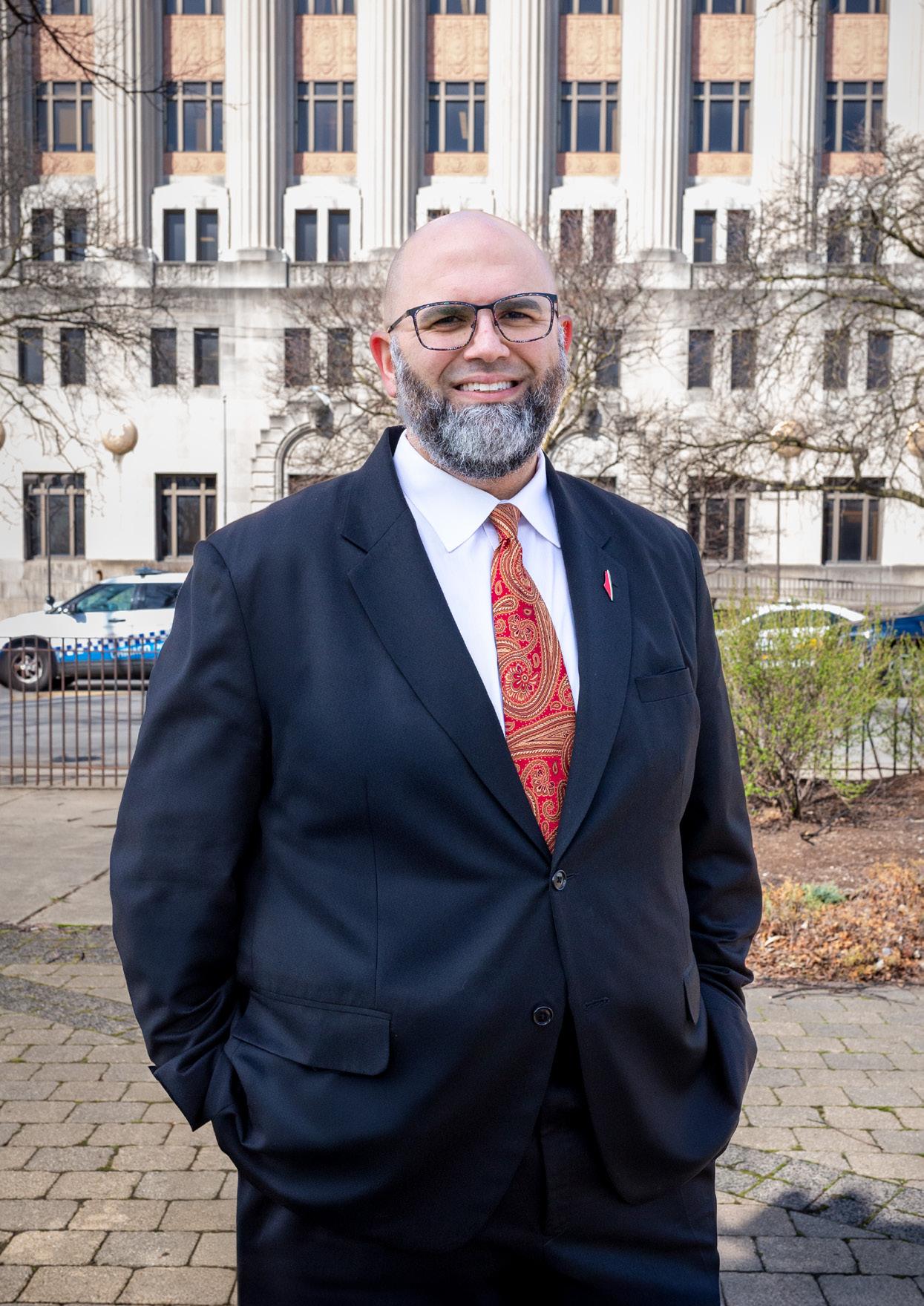

“EVERYBODY LOVES A GOOD REDEMPTION STORY,” says Ginger Leigh Odom ’03. “Every sports movie is about coming from behind and having success, and I think that the expungement-and-sealing statute is an opportunity for redemption. It’s an opportunity for people to move past the past and step into the person that they intend to be.”
Odom is the director of the expungement unit in Illinois’s Office of the State Appellate Defender. In her current role, she helps facilitate the relief process for people throughout the state who have a criminal record by connecting self-representing litigants and legal aid and private attorneys with resources that can help guide them through the expungement process.
“Every year, Illinois prisons release 19,000 people back into society,” she says. “Every single one of those people is or will become eligible for some kind of relief. That’s an opportunity for service that I don’t get just doing one case at a time.”
Odom also does her best to get into the community to help make people aware of OSAD’s expungement program.
She is co-chair of Chicago’s Pilsen Neighbors Community Council’s Expungement Expo at the annual Fiesta del Sol, and serves on several forms committees of the Access to Justice Commission, where she helps draft forms for self-representing litigants to access criminal records relief.
“In school, I wrote on one of my books, ‘Why do we kill people who kill people to show people that killing people is wrong?’ It just makes no sense.” —Ginger Leigh Odom
But before she headed up the expungement unit, Odom was working one criminal appeal case at a time, including a case in Texas involving an inmate on death row. She says she “always hated the death penalty.”
“In school, I wrote on one of my books, ‘Why do we kill people who kill people to show people that killing people is wrong?’ It just makes no sense,” Odom explains.
Odom worked her first death penalty case when she was still a student at Chicago-Kent College of Law, interning at Clinical Professor Richard Kling’s Criminal Defense Clinic.
“It was such a dramatic, made-for-TV trial where the star witness said, ‘This isn’t him, and he’s still out there,’ and the jury was shocked,” she remembers. “It was super dramatic.”
“The client was acquitted, and I was hooked.”
But her journey back to the courtroom wasn’t easy.
Many of the “traditional” paths to career success weren’t options for Odom, a non-traditional student.
Odom grew up in Texas and moved to New York to study dance and theater as soon as she was old enough—in the mid-1980’s when the city’s artists were caught in the throes of the AIDS epidemic.
“I had a lot of friends that were impacted, very deeply impacted by AIDS and by the HIV virus,” says Odom. “My prom date from high school died when I was in my second year of college. There was a lot of angry anti-gay rhetoric floating around about AIDS. So his death led to me having a crisis of consciousness.”
After a few months of healing back home in Texas, Odom returned to New York and completed her studies in comparative literature and physical anthropology at Adelphi University before moving to Chicago.
In Chicago she got a job at Whole Foods when it was launching its first store in the city. Odom eventually began to oversee the
ordering of supplements and other alternative health products. But the United States Food and Drug Administration said that many of the supplements hadn’t been tested, and they took them off the shelves.
Odom decided that she wanted to learn more about the law so that she could advocate for the small farmers she worked with to get the supplements on the shelves initially and for others who believed in alternative and natural medicines.
“I thought I wanted to be a lawyer, but I was scared to be a lawyer—and it was three years [of schooling], it was a lot of money,” she says. “I didn’t have a lot of money.”
Odom had also given birth at home to her daughter, an experience which also fueled her interest in advocating for alternate paths to health care. Odom was by this time a single parent and decided that her best plan would be to become a certified paralegal, but her mom pushed back and said she should pursue law school.
That was all Odom needed. She enrolled at Chicago-Kent, where she fell in love with criminal law. She dedicated herself to getting a job at the Law Office of the Cook County (Illinois) Public Defender, but being a single mother created unique obstacles.
“Everyone told me that the way to get hired at the public defender’s office is you have to intern there,” she says. “I couldn’t volunteer at the public defender’s office because I had a family at home. I couldn’t work for free.”
Odom waited tables at a restaurant to get through school. She graduated with no job offers and continued to bartend to pay the bills while she studied for the bar exam.
“The night that I found out that I passed the bar exam, I got a call from a person that I had never met,” says Odom. “She asked what I would do now that I’d passed the bar. I told her I wanted to work on death penalty cases. She said, ‘Do you want to work for me?’”
The woman was Sheila Murphy, the first female presiding judge in Cook County. She gave Odom a job working the death penalty case out of Texas.
With Murphy’s support and encouragement, Odom again applied to the Law Office of the Cook County Public Defender and the Office of the State Appellate Defender, both of which had rejected her just months ago.
This time both offices wanted her, and she wanted to eventually work for both.
“I thought if I worked at OSAD, I might learn from any potential mistakes and become a stronger trial lawyer,” she says. “Then I’ll go and do trial work.”
More than 20 years later, she’s still at OSAD, though she’s no longer dreaming of working on death penalty cases. “Illinois got rid of the death penalty in 2011,” she says, “which is the best way to lose a job that I can think of.”
Until 2020, Odom worked on individual cases, arguing on behalf of indigent clients. It’s a job that former classmate Wade Taylor ’03 says is relentless and unforgiving.
“She’s one of the most passionate attorneys I know in what she does, and what she does is important work,” Taylor says, adding: “She built the expungements program from the ground up. The fact that she can just keep her nose to the grindstone and keep doing this work, even though the odds are bad, is inspiring to watch.”
Odom has found happiness and fulfillment in a position that she sees as helping to bring true justice to communities.
“I feel very lucky, blessed, and highly favored,” she says, “that I found a career that that feeds me as much as I’m able to offer service to others.”
“I NEVER SEE IT THAT I’M THE ONE defending the bad guys,” says Heather Widell ’12. “I’m defending people, and I’m defending the [United States] Constitution.”
Widell has run her own firm, the Law Offices of Heather A. Widell, for the last 10 years. The firm focuses on criminal defense.
Widell considers the decade that she’s spent as her own boss to largely be a success, but the road to get there was not straight forward. The lifelong athlete graduated from Syracuse University with a degree in sports management marketing.
“I thought I could be an agent, because I was not going to be in the WNBA or on any national soccer teams,” she says, laughing.
She then enrolled at Chicago-Kent College of Law because going to law school would allow her to draft her own contracts, but after a year focusing her studies on contracts, she was so miserable that she was on the verge of leaving the program—until she signed up for Teaching Professor David A. Erickson’s Adjudicative Procedure Process course.
Erickson, who is the director of Chicago-Kent’s Trial Advocacy Program, immediately recognized Widell’s talent for public speaking and recruited her to the trial advocacy team.
“My second year, I felt like I had a family and a lot of that was because of trial team,” she says. “My first team went to nationals, and I hadn’t even taken Evidence yet. It was wild.”
When she graduated, Widell took a job at what was then known as Smith Amundsen doing insurance defense litigation.
She quickly realized that it was not a good fit.
“I have a gift to be able to give a voice to the voiceless and help people,” she says. “I felt that my skill set was not being utilized properly defending insurance companies.”
Without having another job lined up, she left Smith Amundsen and spent a few months job searching before a bit of good luck came her way.
At a public event, her father met John Fitzgerald Lyke Jr. ’94, currently a Circuit Court of Cook County judge but who was, at that time, a defense attorney leading his own firm.
Widell showed up to her interview to learn she already had the job.
“I saw your name in the trophy case. I read up on you. You’re hired,” Widell remembers Lyke saying, adding: “Within
a couple of weeks, he had me doing my first murder trial. It was trial by fire. I got thrown right in, and I loved it.”
She continues, “I quickly found that it was something that I, again, could use my superpower of giving a voice to the voiceless, trying to fight for justice where I can, to fix in any way systemic injustices, a broken system, and actually help people.”
She had been working at Lyke’s firm for a little more than a year when he was appointed to the bench, and Widell had the opportunity to buy the firm. She was still in her twenties.
“It was lost on me a little bit how big that was until I started seeing reactions on people’s faces,” says Widell. “I was kind of still a kid. I’m in control of all these people’s lives and freedom. This is scary.”
In the beginning, Widell was joined by Nicholas Economakos ’12, a friend from the Trial Advocacy Program.
“Every day, I can help a little bit to repair some of the systemic injustices so that we can be on a more equal footing.”—Heather Widell
The two practiced together for four years before he decided to focus on civil work, at which time he joined Bellows Law Group as principal litigation and negotiation counsel.
“We were inseparable from moment one, winning our first tournament together and planning to have a criminal defense firm together someday. That dream eventually became a reality,” he says. “We both grew as attorneys so much, being thrust into the middle of a hectic trial schedule, with everything from drug cases to murders.
“Heather is the most incredible human being I’ve ever met,” he continues. “There is not a more naturally talented lawyer I’ve ever seen in a courtroom. She has incredible instincts. She is sassy, likable, assertive, and brilliant. She is a cross-examination artist that is truly a joy to watch.”
While Widell usually keeps a low profile, she was thrust into the spotlight when she represented Jussie Smollett, an actor accused of orchestrating a faux hate crime against himself. She represented Smollett during the appeals process, which Widell’s team eventually won.
“The state had a deal with him to dismiss
his case if he did community service and surrendered his bond, which he did,” says Widell. “There was no jurisdiction, no precedent for them to just bring back a case that had been duly dismissed.”
The case garnered so much media attention that Widell got a new look into the way the justice system works.
“That was probably the most dramatic case that I’ve done,” she says. “I’ve done a bunch of murder trials, but that one, even though it was a class four felony for filing a false police report, turned out to be the biggest insight into how everything works in the system from start to finish. He was already tried and convicted in the court of public opinion way before we even stepped foot in the courtroom. It was one of the saddest realizations, that a lot of times in our system, you are not innocent until proven guilty.”
But most of Widell’s clients aren’t celebrities—they’re people being prosecuted by a system that is much more powerful than them.
“I try not to think about whether they actually did it or not, but there have been a few that I knew they really didn’t do this,” she says. “Those have been the scariest moments to think that someone who is innocent could be facing however many years, decades of their lives.”
She was recently arguing for the release of one of her clients and got upset about the way the prosector asked for a longer sentence, in what Widell thought to be a flippant matter.
“Has anybody in this room spent even a day in Cook County jail?” she demanded passionately. “He’s spent already nine years of his life, almost more than a third of his life, in Cook County custody for something he did not do. This is not justice.”
Those last four words brought tears to her eyes.
“I appreciated not that I was crying in court, but that I could still, after 10 years, be moved to tears for the want of justice,” she says.
Her client is still in jail, and Widell is still fighting for him.
“Every day, I can help a little bit to repair some of the systemic injustices so that we can be on a more equal footing,” she says, “instead of having the giants [against] the little guys who don’t stand a chance a lot of the time.”

THE FOURTH AMENDMENT PROHIBITS POLICE from performing unreasonable searches and seizures. The United States Constitution does not define reasonable and unreasonable in this context, and even worse, the Constitution says nothing about what happens if the police break the rules. It therefore falls to the courts to devise a series of doctrines to govern police investigations. To the student of criminal procedure, some of these doctrines will be familiar. There is the third-party doctrine, which holds that evidence gained from third parties—such as witnesses or accomplices—do not count as a search of the suspect for Fourth Amendment purposes. There is the exclusionary rule, which says that evidence that results from an unreasonable search or seizure is largely to be excluded from the prosecution’s case-in-chief; such exclusion is subject to several exceptions. And there are several more well-known doctrines: the plain view doctrine, the thirdparty consent doctrine, the automobile doctrine, and so on. I am currently writing an article on a doctrine no less important than these, but that courts have yet to name.
I call the unnamed doctrine the “Missed Opportunity Doctrine.” It provides that when police have an opportunity to legally access some evidence, if they miss that opportunity, they cannot access the evidence later, absent a new legal basis for doing so. To give an example, suppose the police have an arrest warrant for someone named Bob. With the arrest warrant, the police are allowed go to Bob’s home and arrest Bob. While they are at Bob’s house, if they see illegal drugs on his kitchen table, they can seize those right away. However, if the police ignore the drugs and walk off the property with Bob in handcuffs, they cannot run back inside the home to seize the drugs later. The arrest warrant only allowed police to be on the property long enough to arrest Bob. Since he is already arrested and off the property, the arrest warrant does not justify reentry. Police would need a new legal basis for entering Bob’s home, such as a search warrant from a judge or the homeowner’s permission. The mere presence of the drugs is not a sufficient legal basis. If the police seize the drugs anyway without that new legal basis, they will be excluded at trial.
The “Missed Opportunity Doctrine” can seem pretty unobjectionable until one notices a tension between it and another Fourth Amendment doctrine. The inevitable discovery doctrine holds that when police lack legal basis for seizing evidence now but will “inevitably” have a legal
Raff Donelson
basis for seizing the evidence later, that evidence can be used at trial against the defendant. Putting it a different way, inevitable discovery says that police who gather evidence too early (before they have a right to seize the evidence) are OK; while missed opportunity says that police who gather evidence too late (after they no longer have a right to seize the evidence) are not OK. This is puzzling!
The work of my new article is both to highlight this undiscovered puzzle and to stress the importance of naming our practices. Courts have long followed the “Missed Opportunity Doctrine,” but because they have not acknowledged and named what they were doing, neither they nor attorneys nor scholars have been able to critically evaluate the doctrine or determine its fit within our system of criminal procedure. What we don’t reference we can’t rectify. Professor of Law Raff Donelson
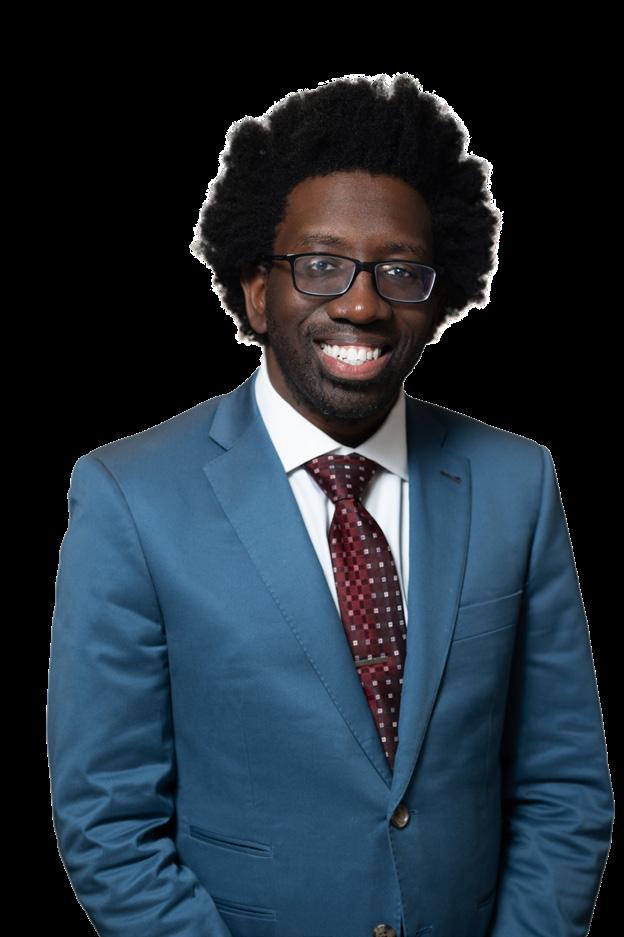
Eldon Ham (LAW ’76), Chicago, is a frequent contributor to the Chicago-Sun Times who recently published articles titled “Heisman Trophy Should Once Again Require Player Integrity” and “DEI, Rooney Rule, and NFL ‘End Racism’ Hypocrisy.”
Timothy “Tim” Cavanagh (LAW ’87), Chicago, obtained a $27 million settlement in a tragic wrongful death trucking case, an $11.1 million settlement in a product liability case, and a $50 million settlement in a railroad Federal Employers Liability Act case. His firm was also named to the 2025 Best Law Firm list, and Cavanagh was named to the Best Lawyers list.
John Locallo (LAW ’86, LL.M. ’92), Chicago, was awarded the Illinois Bar Foundation’s 2024 Distinguished Service to Law and Society Award at its annual Champions Breakfast.
Robert “Bob” Delaney (LAW ’94), Chicago, rejoined the firm Nyhan, Bambrick, Kinzie, & Lowry, P.C. as counsel after previously being retired. Delaney focuses his practice in workers’ compensation defense.
Alice Kokodis (LAW ’95), Wellesly, Mass., was elevated to shareholder in the Boston office of Littler, the world’s largest employment and labor law practice representing management.
Melissa Dillenbeck (LAW ’01), La Grange, Ill., was promoted to partner at Faegre Drinker. Dillenbeck is a part of the firm’s intellectual property practice group and counsels companies on all aspects of their marketing practices.
Sherizaan Minwalla (LAW ’02), Philadelphia, launched a consulting
firm, Taboo LLC, to focus on access to justice, human rights, and the ethical documentation of sexual violence in conflict. Minwalla consults with the International Organization for Migration to implement a do-noharm approach to reparations under the Yazidi (Female) Survivors Law, which was adopted by Iraq in 2021.
Mathew Rich (LAW ’04), Chicago, joined national business law firm Howard & Howard in its Chicago office. Rich concentrates his practice on transactional real estate matters, advising his clients on all facets of residential and commercial real estate transactions.
Sylvia Bokyung St. Clair (LAW ’13), Santa Clarita, Calif., was promoted to partner at Faegre Drinker. St. Clair is a part of the firm’s labor and employment practice group and represents employers in a broad range of employment matters arising under both state and federal laws and is recognized nationally for her work in employment law.
Emily Chase-Sosnoff (LAW ’13), Tampa, Fla., has joined nationwide employment law firm Jackson Lewis P.C. as a principal in its Tampa office.
Ryan Connery (LAW ’13), Clearwater Beach, Fla., joined Fox Rothschild in Chicago as counsel in the Taxation and Wealth Planning Department.
Monika Trujillo (LAW ’14) Oak Park, Ill., and Sean Fitzgerald (LAW ’19), Chicago, were promoted to partner at Schouest, Bamdas, Soshea, BenMaier & Eastham PLLC. They both work with cases arising under the Defense Base Act and matters before the United States Department of Labor.
Siri Arends Graham (LAW ’23), Chicago, Maeghann Hoal (LAW ’23), Chicago, and Sean Nevin (LAW ’23), Tinley Park, Ill., coached four
Chicago-Kent Trial Advocacy team members who won Region Nine of the nationally renowned National Trial Competition that was hosted by Chicago-Kent. The competition is co-sponsored by the American College of Trial Lawyers and the Texas Young Lawyers Association. This is the third time in the history of Chicago-Kent that both teams advanced to the national stage and the 31st time that a Chicago-Kent team has won the region round in the last 40 years.
Gabriel Kokoszka (LAW ’24), Austin, Texas, joined Schaumburg-based Lavelle Law as an associate. He will focus his work primarily on matters related to estate administration and probate.
Grace Heidorn (LAW ’24), Detroit, joined Bodman PLC as an associate in the firm’s Litigation and Alternative Dispute Resolution Practice Group.
Louis H. Bluestein ’51
Thomas “Tom” D. Flanagan ’63
Andre A. Moenssens ’66
Edward J. Kanter ’67
Robert E. Schulz ’68
Jerome M. Gardberg ’70
James E. Staruck ’72
Raymond H. Schleeper ’73
Michael G. Tomeczko ’75
Scott A. Mayer ’76
Philip J. Nathanson ’79
Mary Jo Kanady ’80
James “Jim” J. Dombek ’81
Ralph “Chris” C. Naylor ’81
Kevin M. Colombo ’82
Jane C. Fraytet ’82
Kevin J. Ryan ’87
Kelvin C. Bulger ’88
Walter M. Douglas ’89
Brent S. Lipschultz ’91
Jeffery “Jeff” L. Wilgus ’98
Jacob T. DiCiaula ’08

As the leading law school in the country that is affiliated with a technology university, Chicago-Kent College of Law understands the complex ways that tech, law, business, and our world are inextricably linked. That’s why we equip every student with the timeless skills that they need to meet the demands of legal practice today, tomorrow, and far into the future. Starting today, your investment in Chicago-Kent is part of Power the Difference: Our Campaign for Illinois Tech. Thanks to your contribution, students will be immersed in the engaging, hands-on experiences that are crucial to successful careers. Ultimately, your investment will help graduates step into a courtroom, boardroom, or any other room and make an immediate impact.
To learn more and to make a gift, please visit kentlaw.iit.edu/law/alumni.